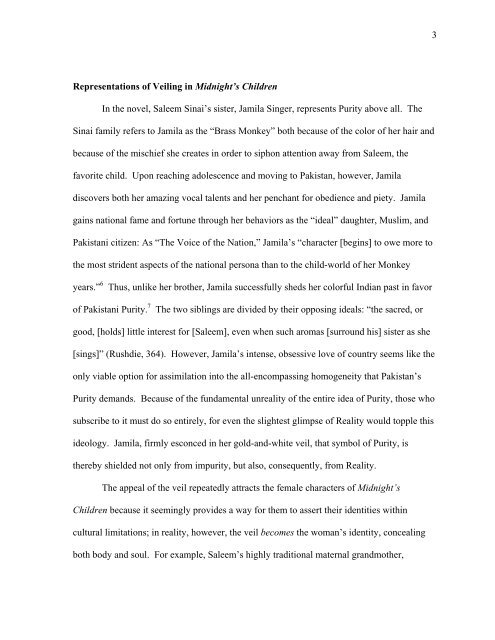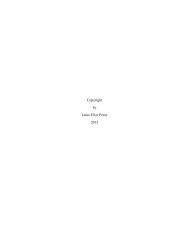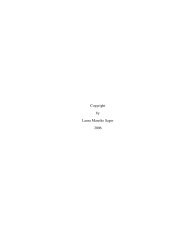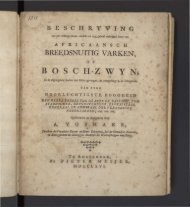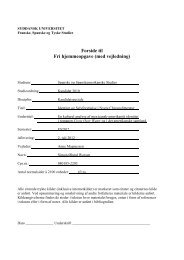The Secret Society: Descendants of Crypto-Jews in the San Antonio ...
The Secret Society: Descendants of Crypto-Jews in the San Antonio ...
The Secret Society: Descendants of Crypto-Jews in the San Antonio ...
Create successful ePaper yourself
Turn your PDF publications into a flip-book with our unique Google optimized e-Paper software.
3<br />
Representations <strong>of</strong> Veil<strong>in</strong>g <strong>in</strong> Midnight’s Children<br />
In <strong>the</strong> novel, Saleem S<strong>in</strong>ai’s sister, Jamila S<strong>in</strong>ger, represents Purity above all. <strong>The</strong><br />
S<strong>in</strong>ai family refers to Jamila as <strong>the</strong> “Brass Monkey” both because <strong>of</strong> <strong>the</strong> color <strong>of</strong> her hair and<br />
because <strong>of</strong> <strong>the</strong> mischief she creates <strong>in</strong> order to siphon attention away from Saleem, <strong>the</strong><br />
favorite child. Upon reach<strong>in</strong>g adolescence and mov<strong>in</strong>g to Pakistan, however, Jamila<br />
discovers both her amaz<strong>in</strong>g vocal talents and her penchant for obedience and piety. Jamila<br />
ga<strong>in</strong>s national fame and fortune through her behaviors as <strong>the</strong> “ideal” daughter, Muslim, and<br />
Pakistani citizen: As “<strong>The</strong> Voice <strong>of</strong> <strong>the</strong> Nation,” Jamila’s “character [beg<strong>in</strong>s] to owe more to<br />
<strong>the</strong> most strident aspects <strong>of</strong> <strong>the</strong> national persona than to <strong>the</strong> child-world <strong>of</strong> her Monkey<br />
years.” 6<br />
Thus, unlike her bro<strong>the</strong>r, Jamila successfully sheds her colorful Indian past <strong>in</strong> favor<br />
<strong>of</strong> Pakistani Purity. 7<br />
<strong>The</strong> two sibl<strong>in</strong>gs are divided by <strong>the</strong>ir oppos<strong>in</strong>g ideals: “<strong>the</strong> sacred, or<br />
good, [holds] little <strong>in</strong>terest for [Saleem], even when such aromas [surround his] sister as she<br />
[s<strong>in</strong>gs]” (Rushdie, 364). However, Jamila’s <strong>in</strong>tense, obsessive love <strong>of</strong> country seems like <strong>the</strong><br />
only viable option for assimilation <strong>in</strong>to <strong>the</strong> all-encompass<strong>in</strong>g homogeneity that Pakistan’s<br />
Purity demands. Because <strong>of</strong> <strong>the</strong> fundamental unreality <strong>of</strong> <strong>the</strong> entire idea <strong>of</strong> Purity, those who<br />
subscribe to it must do so entirely, for even <strong>the</strong> slightest glimpse <strong>of</strong> Reality would topple this<br />
ideology. Jamila, firmly esconced <strong>in</strong> her gold-and-white veil, that symbol <strong>of</strong> Purity, is<br />
<strong>the</strong>reby shielded not only from impurity, but also, consequently, from Reality.<br />
<strong>The</strong> appeal <strong>of</strong> <strong>the</strong> veil repeatedly attracts <strong>the</strong> female characters <strong>of</strong> Midnight’s<br />
Children because it seem<strong>in</strong>gly provides a way for <strong>the</strong>m to assert <strong>the</strong>ir identities with<strong>in</strong><br />
cultural limitations; <strong>in</strong> reality, however, <strong>the</strong> veil becomes <strong>the</strong> woman’s identity, conceal<strong>in</strong>g<br />
both body and soul. For example, Saleem’s highly traditional maternal grandmo<strong>the</strong>r,


